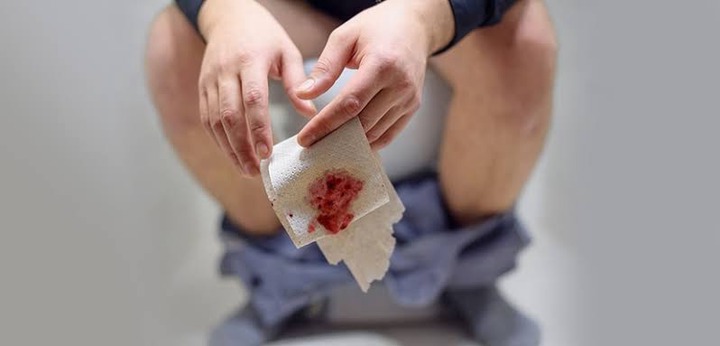Blood in the stool usually appear strange and may cause panic in the individual experiencing it. However, research shows that some stool bleeding is harmless while others may pose health hazards to the individual.
Blood in the stool may result from bleeding in the upper (mouth, oesophagus, stomach, duodenum) or lower (large intestine, rectum, anus) region of the digestive tract.
The colour of the blood present in the stool can determine the region in the alimentary tract it’s originating from. Dark tarry bloody stool is a sign that the bleeding is from the upper region of the gastrointestinal tract (digestive system) while a bright red bloody stool is a sign that the bleeding is from the lower region of the alimentary tract.
Blood in the stool in mild cases may be associated with an unexplainable abdominal pains, pains during stooling, small amount of blood in the stool, etc.
The 4 reasons for bloody stooling include;
1. Anal fissures: These are small things tear in the lining of the anus. The bleeding caused by the tear may reflect in the stool causing blood in the stool. This is generally harmless as the injury in the anus heals with time.
2. Peptic ulcers: these are sores or injury in the lining of the stomach or duodenum caused by Helicobacter pylori. When Peptic ulcer form on a blood vessels it can induce bleeding leading to blood in the stool.
3. Gastroenteritis: is a condition which induce stomach upset caused by bacterial or viral infection. Medically, it is usually called food poisoning or stomach flu. The symptom include bloody diarrhea.
4. Haemorrhoid or Piles: constipation is an underlying factor for this form of gastrointestinal problem. Swollen veins in the lower rectum becomes ruptured when straining or hard stool is being passed out, thus causing blood in the stool.
However, when an individual notice or observe large amount or volume of dark or red blood in the stool, dizziness, shortness of breath, extreme fatigue, pale body appearance, rapid heartbeat, etc the attention of a medical practitioner should be sought for immediately as these, indicate signs of anaemia or blood shortage.

 Latest5 days ago
Latest5 days ago
 Trends6 days ago
Trends6 days ago
 Health1 week ago
Health1 week ago
 Football1 week ago
Football1 week ago
 Football1 week ago
Football1 week ago
 Latest1 week ago
Latest1 week ago
 Health1 week ago
Health1 week ago
 Latest1 week ago
Latest1 week ago

